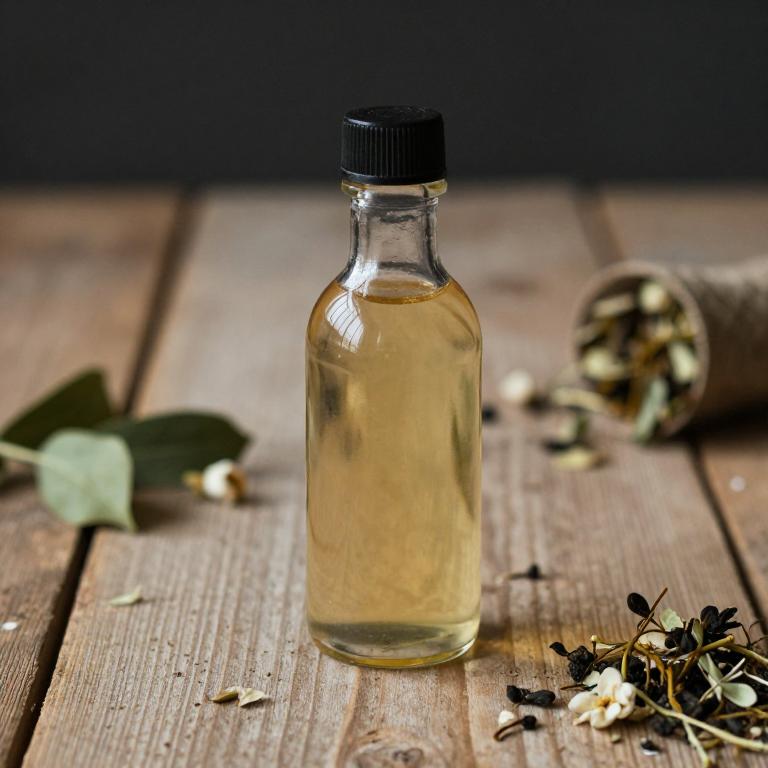10 Best Herbal Syrups For Nasal Congestion

Herbal syrups for nasal congestion are natural remedies that often contain ingredients like eucalyptus, ginger, and garlic, which are believed to help alleviate symptoms of colds and sinus issues.
These syrups are typically used to reduce inflammation, loosen mucus, and ease breathing through the nasal passages. They are popular among individuals seeking alternative treatments with fewer side effects compared to over-the-counter medications. Many herbal syrups are available in different formulations, such as those targeting dry or productive congestion.
However, it is important to consult a healthcare professional before use, especially for children or those with existing health conditions.
Table of Contents
- 1. Eucalyptus (Eucalyptus globulus)
- 2. Peppermint (Mentha piperita)
- 3. Ginger (Zingiber officinale)
- 4. Camellia (Camellia sinensis)
- 5. Black pepper (Piper nigrum)
- 6. Salvia (Salvia officinalis)
- 7. Ceylon cinnamon (Cinnamomum verum)
- 8. Stinging nettle (Urtica dioica)
- 9. Rosemary (Rosmarinus officinalis)
- 10. Dog rose (Rosa canina)
1. Eucalyptus (Eucalyptus globulus)

Eucalyptus globulus, commonly known as eucalyptus oil, is often used in herbal syrups to alleviate nasal congestion due to its expectorant and decongestant properties.
These syrups typically contain a blend of eucalyptus oil along with other natural ingredients like menthol, thyme, and camphor, which work synergistically to reduce inflammation and loosen mucus in the respiratory tract. The aromatic compounds in eucalyptus globulus help stimulate the nasal passages, promoting easier breathing and reducing the sensation of stuffiness. Herbal syrups are a popular alternative for those seeking natural remedies, especially for mild to moderate nasal congestion caused by colds or allergies.
However, it is important to consult a healthcare professional before use, especially for children or individuals with underlying health conditions.
2. Peppermint (Mentha piperita)

Mentha piperita, commonly known as peppermint, is often used in herbal syrups to alleviate nasal congestion due to its decongestant and expectorant properties.
These syrups typically contain menthol, which helps to soothe irritated nasal passages and promote easier breathing by stimulating cold receptors in the nasal mucosa. The cooling effect of peppermint can also reduce inflammation and mucus buildup, making it a popular remedy for seasonal allergies and common colds. However, it is important to use these syrups in moderation, as excessive intake may cause gastrointestinal discomfort or interact with certain medications.
Overall, mentha piperita herbal syrups offer a natural and effective option for temporary relief of nasal congestion when used as directed.
3. Ginger (Zingiber officinale)

Zingiber officinale, commonly known as ginger, has been traditionally used for its medicinal properties, including its ability to alleviate nasal congestion.
Ginger herbal syrups are often prepared by combining freshly grated ginger with honey or other natural sweeteners, creating a soothing remedy that can help reduce inflammation in the nasal passages. The active compounds in ginger, such as gingerol and shogaol, possess anti-inflammatory and decongestant properties that may help ease breathing in individuals suffering from colds or allergies. These syrups are typically safe for most adults and can be a natural alternative to over-the-counter decongestants.
However, it is advisable to consult a healthcare professional before using ginger syrup, especially for children or those with underlying health conditions.
4. Camellia (Camellia sinensis)

Camellia sinensis, commonly known as the plant from which green and black tea are derived, has been explored for its potential benefits in alleviating nasal congestion through the use of herbal syrups.
These syrups often contain extracts rich in antioxidants and anti-inflammatory compounds, which may help reduce swelling in the nasal passages. Some formulations combine Camellia sinensis with other herbs like eucalyptus or ginger to enhance their decongestant properties. While preliminary research suggests that these syrups may offer some relief, more clinical studies are needed to confirm their efficacy and safety.
As with any herbal remedy, it is important to consult a healthcare professional before use, especially for individuals with existing health conditions or those taking other medications.
5. Black pepper (Piper nigrum)

Piper nigrum, commonly known as black pepper, has been traditionally used in herbal medicine for its potential to alleviate nasal congestion.
The active compound in black pepper, piperine, is believed to have anti-inflammatory and decongestant properties that may help reduce mucus production and improve nasal airflow. When incorporated into herbal syrups, piper nigrum can provide a natural alternative for those seeking relief from cold or sinus-related congestion. These syrups are often combined with other herbs like eucalyptus or ginger to enhance their effectiveness.
However, it is important to consult a healthcare professional before using piper nigrum syrups, especially for individuals with sensitive respiratory systems or existing medical conditions.
6. Salvia (Salvia officinalis)

Salvia officinalis, commonly known as sage, has been traditionally used in herbal medicine for its potential benefits in alleviating nasal congestion.
Herbal syrups made from salvia officinalis are often prepared by infusing the dried leaves in a sweetened liquid, creating a soothing and aromatic remedy. These syrups are believed to help reduce inflammation in the nasal passages and thin mucus, making it easier to expel. While scientific evidence supporting its efficacy for nasal congestion is limited, many people find relief from its antiseptic and decongestant properties.
As with any herbal remedy, it is advisable to consult a healthcare professional before use, especially for children or individuals with existing health conditions.
7. Ceylon cinnamon (Cinnamomum verum)

Cinnamomum verum, commonly known as true cinnamon, has been traditionally used in herbal medicine for its potential therapeutic properties, including its ability to alleviate nasal congestion.
The essential oils extracted from the bark of this plant contain compounds like cinnamaldehyde, which possess antimicrobial and anti-inflammatory effects that may help reduce mucus production and soothe irritated nasal passages. When used in the form of a herbal syrup, cinnamon can provide a soothing and aromatic relief for individuals suffering from colds or sinusitis. However, it is important to note that while some studies suggest its efficacy, more clinical research is needed to fully confirm its benefits for nasal congestion.
As with any herbal remedy, it should be used with caution and under the guidance of a healthcare professional.
8. Stinging nettle (Urtica dioica)

Urtica dioica, commonly known as stinging nettle, has been traditionally used in herbal medicine for its anti-inflammatory and decongestant properties.
When prepared as a syrup, Urtica dioica may help alleviate symptoms of nasal congestion by reducing mucus production and soothing irritated nasal passages. The active compounds in stinging nettle, such as flavonoids and minerals, contribute to its effectiveness in supporting respiratory health. However, it is important to consult with a healthcare professional before using Urtica dioica syrup, especially for individuals with allergies or those taking other medications.
While some studies suggest potential benefits, more research is needed to fully understand its efficacy and safety for nasal congestion.
9. Rosemary (Rosmarinus officinalis)

Rosmarinus officinalis, commonly known as rosemary, is often used in herbal syrups to alleviate nasal congestion due to its decongestant and anti-inflammatory properties.
These syrups typically contain essential oils extracted from fresh or dried rosemary leaves, which help to reduce mucus buildup and soothe irritated nasal passages. The aromatic compounds in rosemary, such as cineole and camphor, can stimulate nasal breathing and improve airflow by acting as a natural decongestant. When used as a complementary remedy, rosemary herbal syrups may help relieve symptoms of the common cold, allergies, or sinusitis.
However, it is important to consult a healthcare provider before use, especially for children or individuals with existing medical conditions.
10. Dog rose (Rosa canina)

Rosa canina, commonly known as dog rose, has been traditionally used in herbal medicine for its soothing and anti-inflammatory properties.
Rosa canina herbal syrups are often formulated to help alleviate symptoms of nasal congestion by reducing inflammation in the nasal passages and thinning mucus. These syrups are typically made from the fruit of the Rosa canina plant, which is rich in vitamin C and bioflavonoids. They are considered a natural alternative for those seeking relief from colds, allergies, or sinus issues without the use of synthetic medications.
Due to their mild and gentle nature, Rosa canina syrups are generally safe for use in both adults and children, though it is advisable to consult a healthcare professional before use.